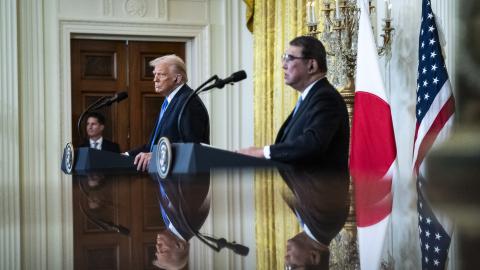TACO Was All Wrong
Kenneth Weinstein, Japan Chair
“Trump Always Chickens Out” was all wrong. By not blinking, President Donald Trump has delivered another big win: Japan opening markets to American cars and agriculture and investing $550 billion in the United States, with a focus on dual-use technologies and strategic supply chain vulnerabilities. Moreover, 90 percent of profits from these investments will be reinvested in the US.
Japan wins as well. The 15 percent overall tariff and the 15 percent auto sector tariff are major improvements over what might have been. And Japan, as Prime Minister Shigeru Ishiba noted, has neither agreed to any export quotas nor tariff reductions on US products.
More deals will follow. Rumors of forthcoming US deals with South Korea and Taiwan will increase the pressure on the European Union and China to make agreements. But the US-Japan deal strengthens the US strategically against China by significantly enhancing its supply chains and critical investment sectors.
A Win-Win
William Chou, Deputy Director, Japan Chair
This trade deal meets US needs. Trump achieved his priorities: (1) a 10 percent baseline tariff, (2) market access for American cars and agricultural goods, and (3) a pledge of $550 billion of Japanese investment in US reindustrialization.
Japan also achieved key priorities. Ishiba managed to (1) cut Japan’s reciprocal tariff rate from 25 percent to 15 percent; (2) lower the Section 232 auto tariff rate from 25 to 15 percent—a major win given that Japan’s auto industry is 10 percent of its economy; (3) increase the American share of Japanese rice imports without increasing the total amount of imported rice, which is important for the LDP farm vote; and (4) ensure that Japan will pay the lowest possible tariff rate on future Section 232 sectoral tariffs, such as semiconductors and pharmaceuticals.
China loses. This deal, along with the recent ones for Indonesia, the Philippines, and Vietnam, effectively removes China’s ability to use trade as a wedge issue between the US and Indo-Pacific countries. This strengthens the White House’s negotiating position against China in the wake of China’s coercive throttling of rare earths exports. It also creates the basis for further economic security cooperation between the US and its key allies and partners.
Trump Shows Flexibility and Resolve
Thomas Duesterberg, Senior Fellow
Trump has proven he will deal. The agreement with Japan shows that Trump will remain tough in achieving a measure of balance with trade partners but has the flexibility to reach acceptable terms.
The US is standing its ground against China’s aggressive economic policies. Along with the recently announced deals with Vietnam and Indonesia, the Japan deal sends a message to Beijing that it will not be easy to induce Asian trade giants away from the US market and join a Chinese-led new economic order.
More Than a Trade Deal
Riley Walters, Senior Fellow
The deal sets a new standard. The 15 percent tariff on Japanese imports will be a new gold standard for trade negotiations. With some countries getting tariffs as high as 19 percent, other major trading partners will want to get similar terms.
The deal is more than just trade. Significant investment commitments in strategic areas like energy, artificial intelligence, and quantum computing show the strength of the US-Japan partnership.
The deal gives the US leverage. The more deals the US can make with its partners, the more leverage it has negotiating with China. As the White House negotiates with its major trading partners, Beijing seeks to benefit from uncertainty.
To speak with these or other Hudson experts, contact Allie Carroll at acarroll@hudson.org.





















